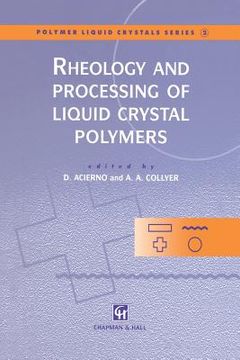Share
Rheology and Processing of Liquid Crystal Polymers (in English)
Acierno, Domenico ; Collyer, A. A. (Author)
·
Springer
· Paperback
Rheology and Processing of Liquid Crystal Polymers (in English) - Acierno, Domenico ; Collyer, A. A.
$ 208.41
$ 219.99
You save: $ 11.58
Choose the list to add your product or create one New List
✓ Product added successfully to the Wishlist.
Go to My WishlistsIt will be shipped from our warehouse between
Friday, June 21 and
Monday, June 24.
You will receive it anywhere in United States between 1 and 3 business days after shipment.
Synopsis "Rheology and Processing of Liquid Crystal Polymers (in English)"
Liquid crystal polymers (LCPs) have many strange properties that may be utilized to advantage in the processing of products made from them and their blends with isotropic polymers. This volume (volume 2 in the series Polymer Liquid Crystals) deals with their strange flow behaviour and the models put forward to explain the phenomena that occur in such polymers and their blends. It has been known for some time that small ad- ditions of a thermotropic LCP to isotropic polymers not only gives an improvement in the strength and stiffness of the blend but improves the processability of the blend over that of the isotropic polymer. In the case of lyotropic LCPs, it is possible to create a molecular composite in which the reinforcement of an isotropic polymer is achieved at a molecular level by the addition of the LCP in a common solvent. If the phenomena can be fully understood both the reinforcement and an increase in the proces- sability of isotropic polymers could be optimized. This book is intended to illustrate the current theories associated with the flow of LCPs and their blends in the hope that such an optimization will be achieved by future research. Chapter 1 introduces the subject of LCPs and describes the ter- minology used; Chapter 2 then discusses the more complex phenomena associated with these materials. In Chapter 3, the way in which these phe- nomena may be modelled using hamiltonians is fully covered.
- 0% (0)
- 0% (0)
- 0% (0)
- 0% (0)
- 0% (0)
All books in our catalog are Original.
The book is written in English.
The binding of this edition is Paperback.
✓ Producto agregado correctamente al carro, Ir a Pagar.

